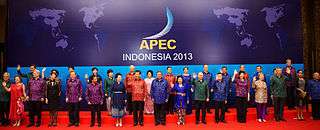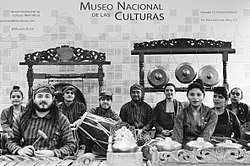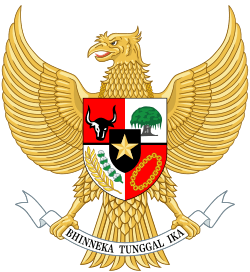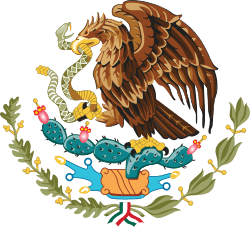Indonesia–Mexico relations
Indonesia–Mexico relations refers to the bilateral relations of Indonesia and Mexico. Both nations view their counterpart as strategic partners in each other's regions; Indonesia in Southeast Asia and Mexico in Latin America.[1] Both nations are mutual members of the Asia-Pacific Economic Cooperation, Forum of East Asia-Latin America Cooperation, Group of 15, G-20 major economies, United Nations and the World Trade Organization.
 | |
Indonesia |
Mexico |
|---|---|
Country comparison
| Country | ||
|---|---|---|
| Area | 1,904,569 square kilometres (735,358 sq mi) | 1,972,550 square kilometres (761,610 sq mi) |
| Population | 261,115,456 (2016) | 123,675,325 (2016) |
| Pop. density | 138 inhabitants per square kilometre (360/sq mi) | 61 inhabitants per square kilometre (160/sq mi) |
| Capital | ||
| Largest city | Jakarta – 10,075,310 (30,214,303 Metro) | Mexico City – 8,918,653 (20,900,000 Metro) |
| Government | Unitary presidential constitutional republic | Federal presidential constitutional republic |
| Language(s) | Indonesian (official) | Spanish (national); No official language at federal level |
| Religions | 87.2% Islam, 9.9% Christianity, 1.7% Hinduism, 0.7% Buddhism, 0.2% Confucianism | 92.7% Christianity, 4.7% Irreligious, 2.6% Unspecified |
| Ethnic groups | 42.6% Javanese, 15.4% Sundanese, 3.4% Malays, 3.3% Madurese, 3% Batak, 2.7% Minangkabau, 2.5% Betawi, 2.4% Bugis, etc. | 47.0% Europeans, 30.0% Mestizos, 21.5% Indigenous, 1.5% others (Africans, Arabs, East Asians, etc.) |
| GDP | $1.074 trillion (nominal, 2018); $3.492 trillion (PPP, 2018) | $2.199 trillion (nominal, 2018); $3.508 trillion (PPP, 2018) |
| GDP per capita | $4,051 (nominal, 2018); $13,162 (PPP, 2018) | $10,021 (nominal, 2017); $20,617 (PPP, 2017) |
| GDP growth rate | 5.1% (2017) | 2.3% (2018) |
History
The first contact between both nations would have taken place with the Manila‑Acapulco Galleon between Acapulco, Mexico and Manila (capital of the Spanish crown in the Philippines). The Spanish traded with the Dutch and Portuguese ports in South-East Asia, and returned to Mexico with goods (and people) from the region. In August 1945, Indonesia obtained its independence from the Netherlands. On 6 April 1953, Indonesia and Mexico established diplomatic relations.[2] Soon afterwards, the Mexican ambassador resident in Tokyo, Japan was accredited to Indonesia. It was not until 1961 that Mexico named a resident ambassador to Indonesia.[2] In 1959, President Sukarno became the first Indonesian head-of-state to visit Mexico. In 1962, Mexican President Adolfo López Mateos paid an official visit to Indonesia.[2]
Indonesian President Susilo Bambang Yudhoyono paid an official visit to Mexico in 2008 and again in 2012 to attend the APEC summit in Los Cabos.[3] During his 2008 visit, President Yudhoyono signed a number of agreements in education, agriculture, promotion of trade and in energy cooperation. In May 2013, Indonesian Foreign Affair Minister Marty Natalegawa paid a visit to Mexico to commemorate the 60th anniversary of Indonesia-Mexico diplomatic relations.[3] To commemorate this event, the Mexican and Indonesian Post Office issued a joint stamp illustrating animals as the symbol of both nations; the Mexican Jaguar (Panthera onca hernandesii) and Indonesian Clouded Leopard (Neofelis diardi).[4]
In 2013, Mexican President Enrique Peña Nieto paid a visit to Bali to attend the APEC summit.[3]
High-level visits


High-level visits from Indonesia to Mexico
- President Sukarno (1959, 1960, 1961)
- President Suharto (1991)
- President Abdurrahman Wahid (2000)
- President Megawati Soekarnoputri (2002)
- President Susilo Bambang Yudhoyono (2008, 2012)
- Foreign Minister Marty Natalegawa (2013)
High-level visits from Mexico to Indonesia
- President Adolfo López Mateos (1962)
- President Carlos Salinas de Gortari (1994)
- President Enrique Peña Nieto (2013)
- Foreign Minister José Antonio Meade (2013)
Bilateral agreements
Both nations have signed several bilateral agreements, such as an Agreement on the establishment of trade between Indonesia and Mexico (1961); Agreement on Scientific and Technical Cooperation (1998); Agreement on Educational and Cultural Cooperation (2001); Memorandum on the establishment of mutual bilateral consultations between both nations (2001); Agreement on the Avoidance of Double-Taxation and Tax Evasion (2004); Agreement of Cooperation in Combating Drug Trafficking, Psychotropic Substances and Chemical Precursors (2011); Memorandum of Understanding in Combating Transnational Crimes and Capacity Development (2011); Agreement on Air Transportation Services (2013); Memorandum of Understanding in Health and Tourism Cooperation (2013) and a Memorandum of Understanding in Export Credit Cooperation between Bancomext and Eximbank of Indonesia (2013).[3]
Trade relations
In 2018, two-way trade between both nations amounted to US$1.7 billion.[5] Indonesia main exports products include: textiles, rubber, palm oil and gold. Mexico's main export products include: silver, copper, cotton, tractors, computer parts and petroleum based products.[3] Mexican multinational company, KidZania operates in Indonesia.[6]
Cultural and educational


The Government of Mexico offers the SRE (Ministry of Foreign Affairs) Postgraduate Scholarship for Indonesians who want to study a postgraduate in Mexico. The Government of Indonesia offers Darmasiswa cultural scholarships so that young Mexicans can learn the Indonesian culture (language, music, theater, batik, dance, etc.) as well as the KNB scholarship for postgraduate level. Currently there exist several groups of Indonesian art and culture in Mexico, starting in 2002 when Fitra Ismu Kusumo[7] founded the group Indra Swara[8] for promoting the art of music (gamelan) and wayang puppets of Indonesia;[9][10] in 2005 Maestra Graciela Lopez founded the Indonesian traditional dance group ¨Tari Bali¨; and then in 2015 another dance group was founded called ¨Mirah Delima¨. There are also the Pencak Silat martial arts groups led by Maestro Ramon Yee, Maestro Hector Becerril, and Maestro Raymundo Wong, as well as the batik art school founded by Master Francisco Sorensic.[11]
Resident diplomatic missions
- Indonesia has an embassy in Mexico City.[12]
- Mexico has an embassy in Jakarta.[13]
References
- The Jakarta Post:Mexico, Indonesia are still good friends after 55 years
- History of diplomatic relations between Mexico and Indonesia (in Spanish)
- Bilateral relations between Mexico and Indonesia (in Spanish)
- 60 Years of Indonesia-Mexico Diplomatic Relations joint stamp issue
- Mexican Ministry of Economy: Indonesia (in Spanish)
- La Ciudad de los Niños llega a Indonesia y Kuwait (in Spanish)
- Purnamasari, Febi (2014). "Pertunjukan Unik Grup Wayang Meksiko Chipotle Teatro - NET12". Inspirasi-Inspiring Person (in Indonesian). NETMEDIA Indonesia. Retrieved May 28, 2014.
- Sánchez, Karla Iberia (2014). "Titere de Sombras de Indonesia". Noticieros Televisa (in Spanish). TELEVISA. Retrieved November 5, 2016.
- Indra Swara Festejo dia de niños, Mexico City, May 1, 2017, p. Cultura
- Wayang grupo Indra Swara, Mexico City, December 1, 2016
- Indra Swara - Arte y Cultura de Indonesia, Mexico City, February 19, 2015
- Embassy of Indonesia in Mexico City
- Embassy of Mexico in Jakarta

